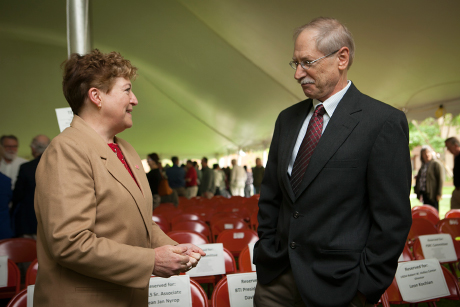New school positions plant and soil science for the future
By Stacey Shackford

Plant and soil scientists at the College of Agriculture and Life Sciences (CALS) have been sowing the seeds of sustainability, food security and improved human health for more than a century.
A new initiative will help position the college for the future and create a new face for the plant and soil sciences at Cornell by integrating five departments – Plant Biology, Horticulture, Plant Breeding and Genetics, Crop and Soil Sciences, and Plant Pathology and Plant-Microbe Biology – in one administrative unit.
The School of Integrative Plant Science was launched at a June 6 ceremony on the Ag Quad, attended by representatives of several departments and many alumni who were on campus for Reunion Weekend.
University President David Skorton commended the college for creating a school that will help advance Cornell’s mission of service to the state, nation and world.
“This is a step toward increasing the impact – that is already enormous – of the very high level of expertise that CALS has in this area,” Skorton said. “Through the new school, CALS aims to strengthen its teaching and research and extension work in plant science and to attract more students to the field – students who will be future leaders in these vital areas.”
“And for our CALS alumni, still another reason to be proud of one of the finest schools of agriculture and life sciences anywhere in the world,” he added.
Skorton was joined by Kathryn J. Boor, the Ronald P. Lynch Dean of CALS; David Stern, president of the Boyce Thompson Institute for Plant Research (BTI); and Alan Collmer, the Andrew J. and Grace B. Nichols Professor of plant pathology, who has been appointed as the school’s first director.
CALS will be teaming up with BTI and the U.S. Department of Agriculture to invest $35 million in the new school over the next decade, for faculty hiring, research and student support.
“It’s an investment in addressing the big challenges,” Boor said. “Whether it’s creating a more secure, nutritious and sustainable food system to feed a rapidly growing global population; devising new plant-based medicines, materials and sources of bioenergy; or ensuring the biodiversity and health of the ecosystem that supports all life on Earth; basic and applied plant and soil sciences provide the very foundation upon which our society will build enduring solutions to a wide range of challenges facing the world today.”
The School of Integrative Plant Science was conceived by a group of faculty members who spent a year examining the current configuration of the plant sciences. They envisioned a school that would provide coordinated administrative functions while maintaining the unique identities of its units and allowing the college to be more nimble in responding to wider scientific trends and societal needs in plant science.
It will offer a plant science major with concentrations that include plant genetics and breeding; sustainable plant production and landscape management; evolution, systematics and ecology; plant physiology and molecular biology; and plants and human health. School faculty members also contribute to several other undergraduate majors, such as agricultural sciences; viticulture and enology; biology (with a plant biology concentration); and international agriculture and rural development, as well as many minors, such as horticulture, crop management and soil science.
Collmer said he hopes the school will foster greater integration and collaboration. It will also enable the units to work in a strategic and cohesive way on matters such as faculty renewal, curricular development and resource allocation, he said.
“Each of the disciplines will be able to maximize their creativity in the context of a coordinating structure that will promote a whole new class of innovative interactions,” Collmer said.
Stacey Shackford is staff writer for the College of Agriculture and Life Sciences.
Media Contact
Get Cornell news delivered right to your inbox.
Subscribe